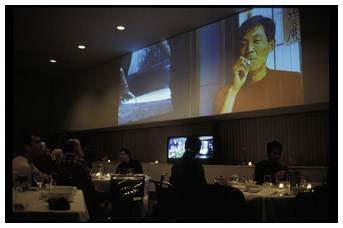


 |


After receiving his master's degree in oil painting at the Zhejiang Academy of Fine Arts and developing a career as a painter, Wang Jian Wei shifted his practice to performance works, video installations, playwriting, and documentary filmmaking. He applies an anthropological method to his work through which he builds a visual inventory of Chinese urban society and its evolution. Wang's documentaries are considered, skeptical reviews of microlocal phenomena, such as the increasingly brutal effects of contemporary urban development in Chinese metropolitan centers.
His film Living Elsewhere (1999-2000) documents the everyday life of a community installed in a failed urban area. For months, Wang filmed a complex of abandoned, unfinished villas in a gated community in the Sichuan province and followed the illegal inhabitants of the houses, peasants who quit the farm life in order to find jobs in the city and failed. The film is defined by attention to the details of a life reinvented from scratch, the small gesture, the unimportant. The protagonists tell their stories directly to the camera. These narratives become the elements of a history based on storytelling, an oral tradition that the medium of film reinvents. This location between city and countryside, between capitalism and socialism, reveals the complexity and the contradictions of what could be envisioned as a new model, a new political, historical, economic, and social project: a phenomenon the artist calls "Fuzzy Space."
With roots in the works of Jean-Luc Godard or Chris Marker, Wang's practice reveals the need to document specific historical, social facts, a need for realism that only photography or film/video can provide. His urge to record matches a desire to write a history that would otherwise remain unknown, in the shadows where the light of the global media fails to reach. His voice is the voice of an alternative; his work advocates a greater public awareness and negotiates a path between the aesthetic and the political.
In 1997, Wang was the first Chinese artist to participate in Documenta in Kassel, Germany. His work has been featured in a number of group exhibitions, including the XXV Bienal de São Paulo, Brazil (2002); The State of Things (Part 1) at Kunst-Werke, Berlin, Germany (2001); My Home Is Yours/Your Home Is Mine, Rodin Gallery, Seoul, South Korea, and Tokyo Opera City Art Gallery, Japan (2000-2001); and the 2000 Shanghai Biennale, China.
--Philippe Vergne